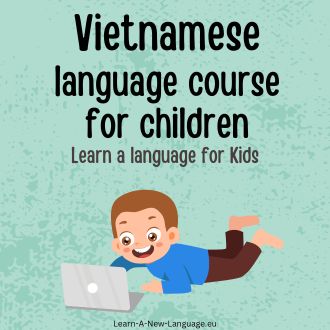Discover a fun, effective Vietnamese language course for children. Playful learning with games ensures quick progress and engagement.

A new Vietnamese language course for children teaches children in a simple and playful way and also ensures fun and entertainment. The brain acts like a sponge and is extremely receptive especially at a young age. Parents can make targeted use of this fact and support their children.
Learn Vietnamese in a playful way with the Vietnamese language course for children by 17-Minute-Languages

Our recommendation: Learn Vietnamese in a playful way with the Vietnamese language course for children by 17-Minute-Languages. This course makes it fun for children to learn new terms and use them in everyday life. Divided into different subject areas, it uses suitable pictures to ensure that the respective terms are well internalized. Words can also be heard, engaging various senses of the child for effective and holistic learning.

–> Order now the Vietnamese language course for children or test the free demo version* <–

Interactive Learning Through Games
In addition to learning, matching games ensure that fun is not neglected and provide motivation to stay engaged. These games are designed specifically for children, such as the popular matching game where kids assign words to images. This type of play helps expand and train their vocabulary and logic. The picture that matches the requested word is clicked with the mouse, making learning interactive and enjoyable.

Easy to use Vietnamese language course for children
For most parents, it is important that an Vietnamese language course for children is user-friendly and engaging, addressing all the children’s senses. Whether reading, listening, or viewing pictures, all elements are pedagogically worthwhile. The courses are suitable even for children who haven’t started school and therefore cannot read.
Making Learning Fun and Motivating
To maintain motivation, it is important to introduce the new language in a fun way. This way, children see learning not as an obligation but as a joy, especially when they can regularly inform their parents about new terms and actively participate in the learning process. The Vietnamese language course for children refers to the world of children, covering familiar topics that they can relate to, ensuring that learning remains engaging and motivating.


The Vietnamese language course for children refers to the world of children and covers topics that are familiar to them and which they can relate to. In addition to learning the new language, the main focus is always on motivation and play. It does not matter whether the numbers are learned in the respective foreign language or the first simple terms.
Generally, the first few figures already offer the children great joy in everyday life, because in practice they can count all things of the environment in the new language and inspire their family with it. Some children are already very familiar with the figures and then turn to other tasks such as learning the weekdays and months in Vietnamese.
Broadening Vocabulary with Interesting Topics
 To ensure learning is never boring, this Vietnamese language course offers many interesting topics for children. They will enjoy learning Vietnamese terms for animals, colors, and more. The 17-Minute-Language course takes these aspects into account, providing a tailor-made learning concept that is both exciting and effective. Each chapter can be dealt with individually, covering numbers, weekdays, animals, colors, and other day-to-day life topics. Practical relevance helps children create effective associations with their learning.
To ensure learning is never boring, this Vietnamese language course offers many interesting topics for children. They will enjoy learning Vietnamese terms for animals, colors, and more. The 17-Minute-Language course takes these aspects into account, providing a tailor-made learning concept that is both exciting and effective. Each chapter can be dealt with individually, covering numbers, weekdays, animals, colors, and other day-to-day life topics. Practical relevance helps children create effective associations with their learning.
Children love a variety of cheerful colors. The 17-Minute-Language Vietnamese language course for children takes these aspects into account in a targeted way and therefore offers children a tailor-made learning concept that is both exciting and effective. One topic, for example, deals exclusively with colors so that the next generation can concentrate on this one topic and learning is especially easy. Each chapter can be dealt with in its own right. It doesn’t matter if numbers, weekdays, animals, colors or other day-to-day life. Practical relevance is always established so that children can create effective associations of learning.

Effective Learning with Parental Support
Children can learn effectively when parents regularly ask for new words and celebrate their successes together. This can be appreciated with a visit to the ice cream parlor or the zoo. These constructive activities help maintain motivation and make learning a shared and rewarding experience.
Leisure topic is particularly popular. Here the little ones usually practice with great enthusiasm, because they combine a lot of fun and adventure with this topic area. The same applies to summer holidays, clothing, food and the like.
Children can learn effectively if parents regularly ask for a few words and are happy about the achieved successes together with the child when a chapter is completed, this can, of course, be appreciated. Maybe with a visit to the ice cream parlor or a visit to the zoo. The possibilities are manifold and can be used constructively by parents and children.

–> Order now the Vietnamese language course for children or test the free demo version* <–

Learn Vietnamese with games and fun
Comprehensive Learning Experience
Parents will be thrilled with the effectiveness of this course and the successes their children can achieve in a short period. Vocabulary is set to music and accompanied by pictures, making it easy for even young children to internalize words visually. The course includes a practical children’s dictionary, allowing kids to look up words and phrases comfortably.
Building a Strong Foundation for the Future
Starting to learn a foreign language at an early age provides many advantages. It not only makes future learning easier but also ties in with positive aspects of early education. Using their language skills on holiday, children broaden their horizons, enhancing their quality of life and creativity. The ability to concentrate is trained, which positively impacts their academic and professional careers.
Children appreciate the beauty of life. This also applies to music and the corresponding musical instruments. Therefore, it is easy for the little ones to learn the respective terms in Vietnamese. The same applies to light sentences such as questions about what is available for breakfast or the statement that children like chocolate. A Vietnamese language course for children is ideal for children who enjoy playing and would like to learn a new language at the same time.

Parents can support their children and learn the first basic grammatical rules. Multimedia-based children’s courses support the little ones comprehensively and in a way that is suitable for children. Children who start learning a foreign language at an early age have many advantages later on in school, and generally, it is much easier for them to learn because it ties in with positive aspects.
It is also great fun for children to use their foreign language skills on holiday, as this knowledge broadens their horizons and is conducive to creative subconsciousness and quality of life. Children are justifiably proud of every newly learned word and this feeling can still be supported by their parents, so learning will be fun even in later years. In addition, the children’s ability to concentrate is trained, which also has a positive effect on their later academic and professional careers.


Great links for everyone who wants to learn Vietnamese:
- Vietnamese Language Course for beginners
- Vietnamese for intermediate learners
- Vietnamese Business Language Course
- Learn Vietnamese with Mondly
English is not your mothertongue? Use this language courses for other mother tongues:
- Deutsch – Vietnamesisch Sprachkurs für Kinder
Helpful language learning tipps:
- The different ways of learning languages
- Learning vocabulary successfully
- Motivated language learning
- It is so easy to train your understanding of a language at the same time
- Learning languages quickly? – Is it possible?
- The different types of learners when learning languages
- About countries and languages


